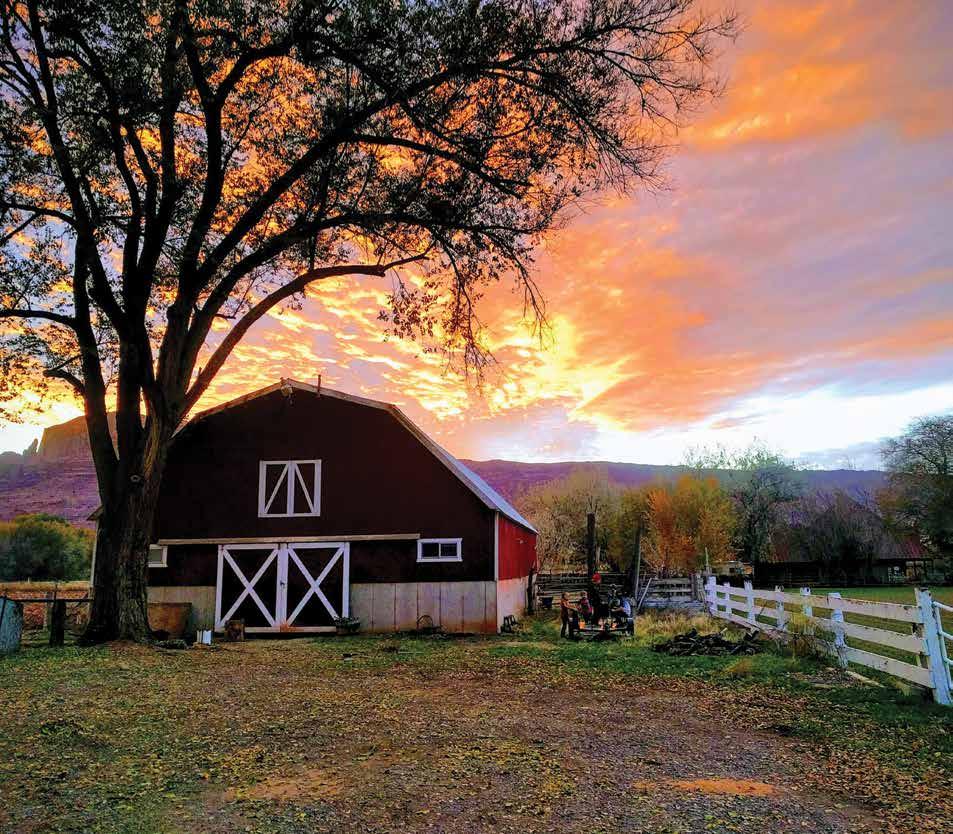
7 minute read
Our Village” comes to life
WITH A THRIVING PRESCHOOL IN PLACE, ANNIE THOMAS AIMS TO TAKE A NATURE-ORIENTED COMMUNITY CENTER TO THE NEXT LEVEL
Written by Sharon Sullivan
INSPIRED BY VISITS TO “FARMER RAY” F ive acres in Moab once destined for development have instead become a nonprofit community center site where multi-generations are encouraged to come and share skills and learn from one another. Annie Thomas lives across the street from the farm formerly owned by the late Ray Alger. Two years ago, Thomas envisioned something different for the land. Thomas ran the Sego Lily Children’s Garden in her home — a preschool based on the Waldorf philosophy of education that emphasizes art, the natural world, and learning practical skills. For several years Thomas would bring her own children to visit “Farmer Ray.” He’d invite them to pick apples, and to visit his horses and cows. Later she’d bring her preschool students to visit the farm. “Ray allowed us to use his farm for adventure time,” says Thomas. “He wanted to keep it as open space.”
The land had nearly been developed decades earlier. Alger’s daughter Katie Hanway says that Alger bought the property around 1955 from someone who had wanted to build a trailer park on the property. “Ray always had horses; he wanted a place for his horses,” she says. In 1963, he built a house on the property. He began irrigating the land, acquired cows, built corrals and a barn. He was a “gentleman farmer on the side” while running his electrical contracting business based next door.
Alger taught his eight grandchildren the value of work. In the summer, he would hire them to feed animals, fix fences, and tend to other chores. They’d fill out timesheets just like his employees, says Hanway. “He thought children needed practical activities” — which aligns exactly with Annie’s vision for Our Village Community Center, she says.
Alger agreed with Thomas’s dream of creating a space where people young and old could come together to share nature, and learn valuable skills from one another.
“We considered whether to sell, keep it as a farm, or develop it,” Hanway says. “Ray told me he really wanted Annie to buy the land. He loved the kids and Annie.” So, when it came time to sell, Thomas was given the first option to buy. Alger learned, before he passed away in May 2018 at the age of 93, that Thomas’s nonprofit Our Village Community Center had secured grant funding from an anonymous donor to purchase the land.
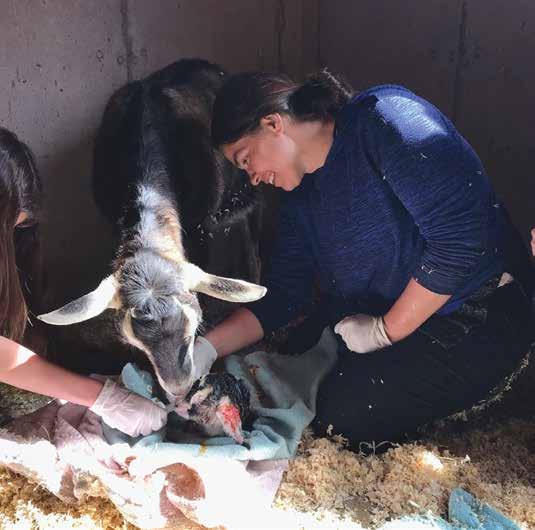

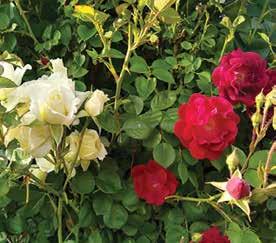
A PLACE WHERE NATURE CAN BE THE TEACHER T homas envisions a village-like, diverse atmosphere on the property where schoolchildren come to learn various skills and experience nature firsthand. The property is near a wetlands area, and is a wildlife corridor, Thomas says. She has plans to create permaculture and botanical gardens. “We will use it to teach local ecology and how we can work to preserve it,” says Thomas, who runs the nonprofit along with a five-member board of directors. At this point, everyone involved in the endeavor is a volunteer, including parents and grandparents associated with the Sego Lily preschool, which is now located on the property.
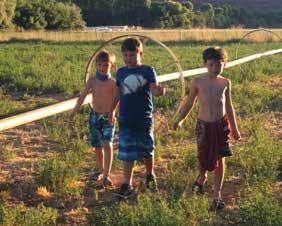
Marcia Tendick has had three grandchildren attend the preschool. The two eldest were enrolled when Thomas taught the children at her home. The youngest goes to the new location at the farm. “I love it; I absolutely love it,” Tendick says. “It’s so wonderful for the kids to be outside. It’s a wonderful place. It’s an ideal place for Waldorf-based education.”
While Our Village seeks to bring community members of all ages together, the preschool, which meets Tuesday through Thursday, offers a consistent time and place where community members already come to the site. “The preschool holds the space for the programming,” says Thomas. The preschool is currently at capacity while Thomas focuses on adding programming for Our Village Community Center.
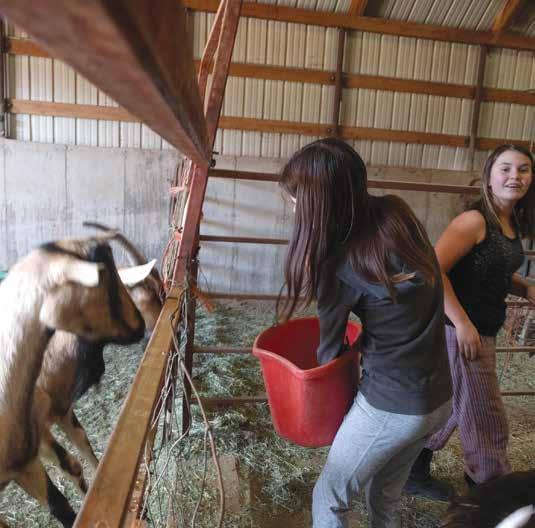
Top left: Matao Thomas and Emory and Oliver Martinez explore the Our Village farm. [Courtesy photo] Top right: Anja Thomas (with bucket) and Rosalee Thomas make an early morning visit to care for Salsa the goat and her kid Anika. [Courtesy photo] Bottom left: At Our Village’s summer camp, girls visit with horse Carmella. Annie Thomas says she has found that girls love of horses helped her develop a mentoring program in which middle school girls mentor younger elementary school girls by taking care of the horses together. [Courtesy photo]
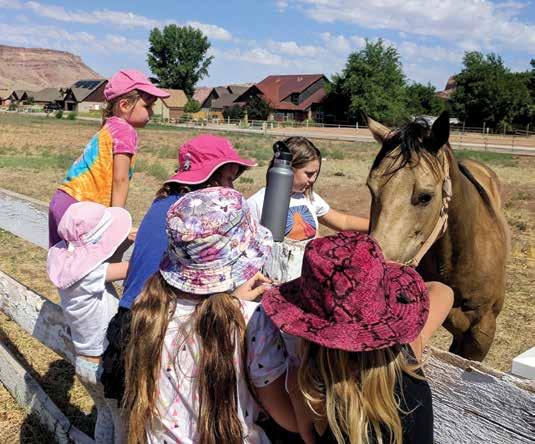
Since becoming a nonprofit in 2018, and launching its first program in August 2019, Our Village has hosted parent-child and parent-teen classes, and held health presentations by naturopathic physician Don Leathers. A Girl Scout troop meets on the property. There have been knitting and doll-making workshops, plus music classes offered by Moab Mini Maestros teachers Kate Clark and Nicole Cornelius. Grand County School District onsite therapist Kyle Dern ran an equine therapy program for schoolkids on the property for a year. The program ended in December, but may start up again in the future, says Thomas.
LOTS OF ROOM TO GROW T homas has plans to turn an old farm building into a shop where woodworking, pottery and blacksmithing can be taught. Thomas envisions a youth center at the site in the afternoons.
“It’s a great facility; it’s so wonderful,” says Clark, who began teaching preschool music classes at the farm last year. “It’s a good fit.”
The Mini Maestros meet once a week, currently with children from 18 months to five years old attending. The children begin with mostly singing, based on the Hungarian Kodaly method that says the first instrument to master is the voice. From there they move on to rhythm instruments, and even learn to read a little music. “It’s interactive; there are lots of games to go with it,” Clark says.
Our Village’s mission includes “building healthy communities through a new paradigm of intergenerational connections, by growing a lifelong love of learning, integrating a heart, hand, and head model of education,” Thomas says.
Thomas intends to preserve the land’s history, too. For example, Alger’s wife Ellen — who died three years prior to her husband — co-owned a radio station, KURA, that was located on the property, before she left that job to work for the National Park Service as secretary to Bates Wilson, who was instrumental in establishing Canyonlands National Park. She later helped her husband with their A&E Electric contracting business which remains in Moab under new ownership.
After the radio station was sold, the building was remodeled into a rental apartment, which now serves as the community center. Our Village programs will take place in the iconic red-roofed barn that Alger built. The orchards will remain, as well as the two horses, three goats, a flock of chickens, a turkey and a rooster. Thomas, who is a mother of four children ages 17, 14, 13, and 9, is not only a preschool director — she’s also become a farmer and the executive director of Our Village. She laughs when asked where she got her nonprofit experience. “I delved headfirst into it all,” she says. “I dived into farming, and developing a nonprofit. And I’m learning how to be a grant writer.” Neighbors help her care for the property at 721 N. 500 West, next to the canoe and kayak outfitter Tex’s Riverways.
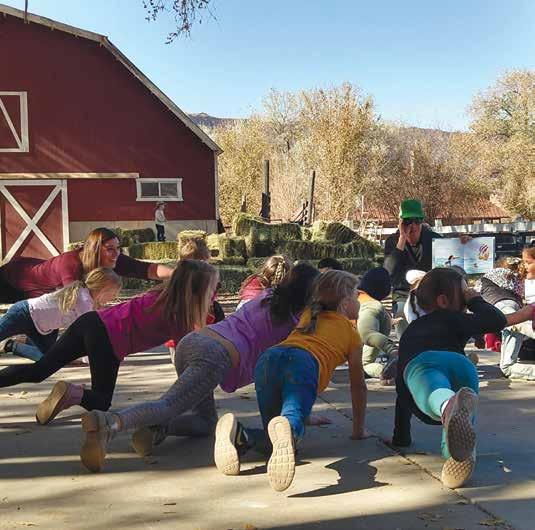

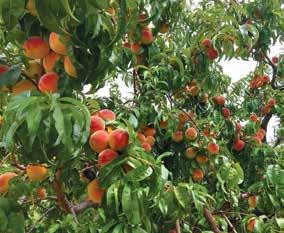
Hanway says she enjoys driving by the property and seeing it remain a place to grow food, raise animals and learn skills. “We were raised there — I have fond memories of it,” she says.
The property was sold under the appraised value because we felt we should carry out Ray’s wishes, Hanway says. However, “we saw this as a win-win situation for everyone. I drive by once in a while just because it’s been such an important part of my life for 60 years. We really feel Our Village Community Center is going to carry through the vision Ray and Ellen Alger had for children to learn practical skills and activities that stand them in good stead for the rest of their lives,” she adds.
“The land is such a special place — that was the driving force,” for making Our Village happen, says Thomas. n










